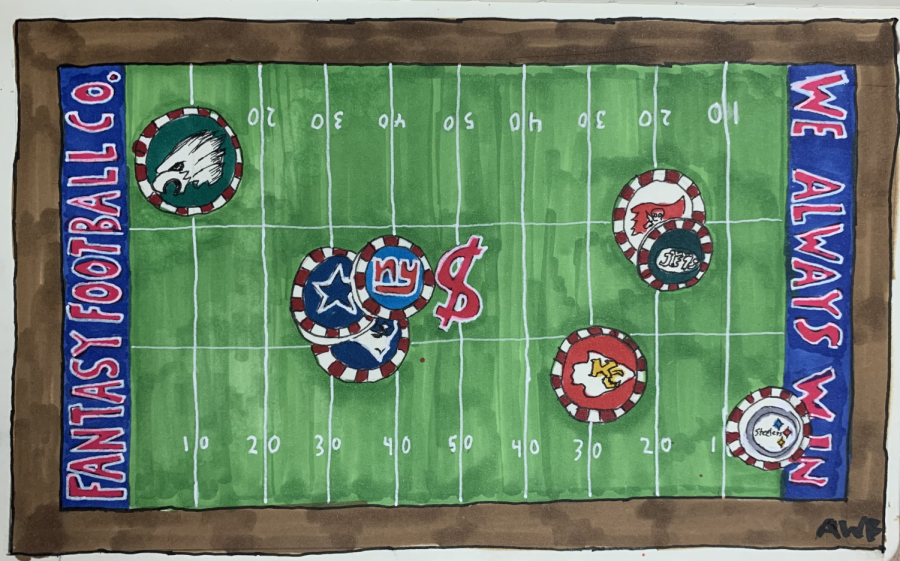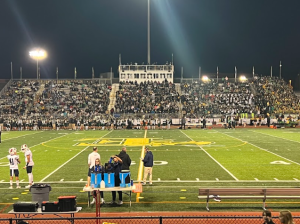Fantasy football poses the gamble of the year
November 10, 2021
This previously ran in our October 2021 print issue.
Fantasy football is a game that can give people hope even when their favorite team has lost that week, but it can bring dread when they lose the big bucks because Saquon Barkley’s ankle ballooned to the size of a football.
Fantasy Football might be the biggest gamble of the entire year, showing how many Americans have devoted each week from September to December researching who will end up being the player with the most points and who will end up self-destructing. People will even end up looking up the odds of a certain player experiencing an injury, such as Carolina Panthers running back Christian McCaffery. Fantasy can be a fun, free game that you and your family will play, or it can be a battle for the ages that you have paid thousands of dollars to experience, not to mention the payout of winning, which is extremely improbable.
Even though many lose quite a bit of money gambling on Fantasy Football, the companies running the game always make plenty.
Fanduel and Draftkings are two major providers of fantasy leagues, and their business model is to take 10 percent of how much someone bets, and then the rest goes into a prize pool for the person that wins the league.
An example: if you bet $20 on a certain player, these two companies will get a payout of $2. Knowing now that Fanduel and DraftKings’ main output is fantasy sports shows that they have made a combined total of $60 million in week one entry fees in the NFL, which is more than the entirety of Las Vegas made in week one of the NFL season. What’s even more amazing is that, in 1988, the fantasy sports market was only worth half a million dollars, and, in only 33 years, it is now standing as a $22.31 billion industry. In 2025, this industry is expected to balloon majorly to around $38.6 billion.
ESPN sits at the moment as the juggernaut of the fantasy world with around 20 million of the near 60 million fantasy football lovers. Other providers that sit near the top of this growing industry are Yahoo Sports, NFL Fantasy, Draftkings, and Fanduel.
Of course, if you know what fantasy football is, then you might know about the boom-or-bust factor. This is when the site that you are using as your fantasy provider projects if a player is projected to perform well, poorly, or to be injured. This is all due to statistics that the player has shown in the weeks and years prior.
Something that can happen is if the 49ers’ wide receiver, Deebo Samuel, has exploded the first four games of the NFL season — which he has — this might mean that he is due to bust and not have a good game. This factor can make their player change their entire strategy.
With the sport of football comes injuries, and injuries mean ruined fantasy teams. This is why it is difficult if you decide to put all of your eggs in one basket and take a really good player with an injury history. This can lead to bets going down the drain and a loss of a shot at the championship.
Take the player Christian McCaffery for example. Last year, McCaffery was the player selected the most as the first pick in the fantasy football draft, and he had an astounding first few weeks. That quickly went down the drain as he dealt with many injuries, problems, and missed games throughout the year. This ended up finishing most fantasy players’ seasons.
Back in 2016, the NFL had agreed to stop marketing fantasy football to kids around the age of 13 or younger. This didn’t mean anything, though, because the NFL got its message across, and more kids continue to play fantasy football to this day.
Most kids play in free leagues, which are leagues that don’t require any betting or a fee to enter and are just for fun. In 2012 alone, 3.5 million kids had begun to play fantasy football. Some people believe that fantasy football isn’t good for kids because it will establish a gambling addiction early on. Others believe that fantasy football is okay for kids because they believe that it will help them develop reading, researching, and strategizing skills.
Fantasy football has a major push towards the future and many believe that this industry might be one of the lone reasons why American football is getting more popular throughout the world; as shown by ESPN, they have now expanded their empire into all five majorly-populated continents. This shows that fantasy football, and American football in general, may become the biggest gamble in the entire world very soon.











